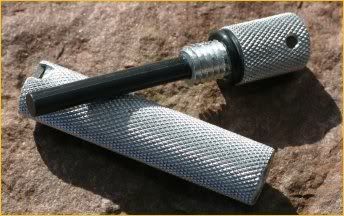A fire starter using any type of flint-steel that is not completely sealed from the elements (especially water) is not a practical survival tool in the real world.
I think that is a bit of hyperbole employed to make their patentable idea seem more necessary than it otherwise might be.
Corrosion of flints isn't really new. Anyone who is old enough to have owned a Zippo and used it enough to need to replace the flint will remember the old yellow plastic card that the flints came on. And that the flints were sealed with a heavy coat of waxy red paint. Last I checked those flints were still available. Next trip to the store I will look.
Seems to me like if there is still liquid butane in a disposable lighter, and the corrosion isn't too bad, you should be able to pop off the chromed shield; pry off the striker wheel; work the old corroded flint out; and insert a new one.
There have been many occasions in which persons needing to use their fire starters have gone to retrieve it, but found only dust in their back packs where their fire starters had been stored. Also, the rods of many types of fire starters (such as the type that has a flint-steel rod mounted on a magnesium block) will react violently when immersed in salt water producing heat and hydrogen gas.
Now I have found flint striker rods, the magnesium blocks with a flint on the side, and ferro rods that have deteriorated. Usually not entirely to dust. And usually only where they were allowed to get, and stay wet for months. Seemed worse in those situations where there were dissimilar metals present.
But I have never seen a Doan's bar, mag bar with flint, "react violently when immersed in salt water producing heat and hydrogen gas". I can't say that I remember keeping one near where it might get wet with salt water. I have had one get and mostly stay damp with sweat, it was riding in my pants pocket for several hot summer days. It was corroded a bit, mostly the magnesium had flaky white corrosion on one side but it didn't get hot or burst into flames. Good thing I guess. Then again it was new and may have been still coated in some sort of sealant or wax.
Which may point out the solution. Heavily wax your flints to keep them protected from oxygen and water. I wonder if silicone might help.
I have kept the same mini-Bic in my front pants pocket for a couple of years and it needs a few more flicks to get it to light if it hasn't been used in a while. Given the warm weather here it probably gets a bit damp regularly from sweat and after two years, maybe more, it still lights. So the corrosion effect wouldn't seem to be an immediate concern. Perhaps just another thing to keep an eye on.
